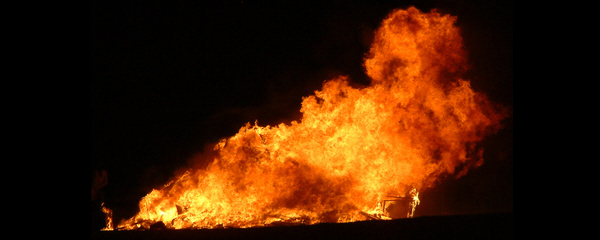
The Short Story and the Bonfire of the Humanities
by Paul March-Russell
Suddenly, without quite becoming front-page news, the short story has hit the UK headlines. The new controller of BBC Radio 4, Gwyneth Williams, has decided to reduce the number of short stories broadcast on the network from three a week to one. Her rationale is that she wants the lunch-time news programme, The World at One, to be fifteen minutes longer so as to reflect ‘the faster development of stories’ with the concomitant loss of the short story slot. It is gratifying to note that more complaints about this decision have been received from listeners to Radio 4’s Feedback than any other. An online petition received over five-thousand signatures within the first few days of the announcement, resulting in what looks like a partial U-turn involving Radio 4’s off-shoot network, Radio 4 Extra. Nevertheless, the decision remains contradictory as Radio 4 continues to support – and to receive the kudos from – the National Short Story Award launched in 2005. Avid listeners to Radio 4 will also remember that until 1998, The World at One was ten minutes longer and the network broadcast five – not three – short stories per week. Has the media landscape really become faster in the intervening thirteen years or does it just feel faster due to the advent and competition of digital technologies? My concern is not with the intricacies of scheduling but the cultural and ideological underpinnings to this decision: a sub-text that, even as it jeopardises the already endangered species of the short story, reveals the short story’s centrality to debates around economic and technological modernity, including the relationship of the arts and humanities to civic society.
Such a relationship seems to be pressing heavily upon Gwyneth Williams’ mind. On 20th July she wrote on the Radio 4 Blog:
Radio 4 aims to broadcast more of ‘the best that has been thought and said in the world’, in the words of Matthew Arnold. This brilliant analysis of culture as an active force is very much the text that inspires me as controller. Culture and Anarchy was written in the most turbulent times of the nineteenth century as science displaced certainty so the echoes of Arnold’s thesis ring particularly true now.
If this comparison is ‘true’, then we too live in ‘turbulent times’ where ‘certainty’ is ‘displaced’ by the forces of modernity. But Williams’ solution to this unrest is to gather and disseminate more news more rapidly using the instruments of science, technology and bureaucratic control that Arnold rejected as markers of a philistine world that, in ‘Dover Beach’ (c. 1851), ‘Hath really neither joy, nor love, nor light, / Nor certitude, nor peace, nor help for pain’. Arnold’s own panacea was a highly idealised version of Hellenic society, in which culture acted less ‘as an active force’ than as a standard of eternal verities to be preserved by a self-appointed elite embodied in the Romantic iconography of ‘The Scholar Gipsy’ (1853) and in lectures such as ‘The Function of Criticism at the Present Time’ (1864). For Arnold, ‘the best that has been thought and said’ was rooted in a Western classical tradition. Who now would make such a claim in an era of multiculturalism and globalisation? Well, apparently (apart from Harold Bloom), Williams would in an attempt to establish Radio 4 as a kind of broadcasting gold standard. To that end, she can rely upon the demographics of the Radio 4 audience – predominantly middle class, middle aged and conservative with a small ‘c’ – but, as a response, it is as short-term as Arnold’s proved to be.
Addressing listeners’ concerns on Feedback on 29th July, Gwyneth Williams rejected the claim that her decision had been financially motivated although it is true that fifteen extra minutes of The World at One would cost considerably less to produce than a specially commissioned short story. It is also true that she would have to enforce any cuts proposed by the BBC’s Delivering Quality First initiative which seeks to reduce the annual budget by 20%. This initiative was implemented as a response to the Coalition Government’s squeeze upon the public sector, to regain audience trust following high-profile scandals and tabloid-led criticisms of high salaries, and to ensure renewal of the BBC’s Charter in 2017. In this context, Williams hardly has a free hand – the BBC’s statement on the initiative ends with the admission that ‘we will have to do fewer things better in content areas’ – but it also undercuts her appeal to Arnold. As Raymond Williams observed in Culture and Society (1958), culture is not a mythical standard but a way of living under social and economic conditions not of the individual’s making. The Radio 4 schedule that its listeners will be receiving as of April 2012 is a reflection, however mediated, of the social and economic life that they will be experiencing as the cuts to the public sector are finally felt.
In emphasising the importance of writers to the network, Gwyneth Williams highlighted Michael Morpurgo’s essay on the Norwegian killings and the series, Letters to the Arab World, and its planned sequel, The 9/11 Letters. If these references are anything to go by, this will be the future of the short story on Radio 4: tales specially commissioned to address current political events that can then be promoted during or after the extended news broadcasts. Williams’ predecessor, Mark Damazer, had already begun this practice with a fifteen-minute topical play on Saturday evenings. The short fiction (read or dramatized) becomes a type of rapid response unit, offering almost immediate comment – rather than oblique or studied reflection – on the week’s unfolding events. This utilitarian use of the short story, baring the instrumental uses to which literary production is now being put, is predicated on the mistaken belief that the short story, simply by virtue of being shorter than the novel, can be mechanically produced and consumed. As many writers and critics of the short story attest (see Charles May’s Reading the Short Story), this consumerist approach completely misrepresents the theory and practice of the short story. Yet, this is the logic of the Delivering Quality First initiative, where ‘every pound of the licence fee’ must ‘work hard for the people who pay for it’, whose effects we (supposedly) will have to come to accept. Arguably, Radio 4’s withdrawal since 1998 from its previously high commitment to fiction and drama, beginning first with the cancellation of Saturday Night Theatre and the shortening of its other play slots, the replacement of the Woman’s Hour reading – including Di Spiers’ productions of new short stories by women writers and the accompanying anthologies – to Damazer’s decision to suspend both morning and afternoon readings and The Friday Play to make way for factual series such as A History of the World in 100 Objects, has been a long process in habituating listeners to these changes so that, when the final cuts are made, we barely notice them. At the time of writing, it is impossible to say how many of the 104 stories that will be broadcast in 2012/13 will be original, how many will be by new or untried writers, and how many will appear on Radio 4 Extra with almost inevitably lower audiences.
Yet, what can be said is that the BBC initiative is rooted in the current Government’s spending plans and that the more gradual departure from fiction broadcasting is symptomatic of the market system that was introduced to the BBC under the directorship of John (now Baron) Birt. [James Boyle, who as controller of Radio 4 cut fiction and drama output in 1998, was known also as ‘MacBirt’.] As an academic working at a UK university, it is hard not to see a parallel story with the institutional changes that began in the mid-1980s and which have culminated in the de facto privatisation of the university sector and what Rob Spence has called ‘the bonfire of the Humanities’ just when, as a culture, we need them most. In The Short Story: An Introduction (2009) I wrote:
Yet, as the legacies of 9/11, the anti-globalisation movement and, most recently, the panic in the international banking system have shown, there is a need for a new political discourse that would address the intersections between global terror, media and economics.
For me, the short story is a political medium since, paraphrasing Chekhov, it poses questions rather than answers. The formal tendency towards fragmentation, allied to the calculated use of word choice and punctuation, also mean that the short story is driven towards an ethical awareness of alterity and of addressing the other (Frank O’Connor’s instance of the ‘submerged population group’ is only the most well-known linkage of the short story in this direction). As Allan Massie wrote in The Daily Telegraph (19th July):
The short story has its origins in tales told in caves or around a camp fire, which begin: ‘There was once a man…’ Radio, with its intimacy, a voice speaking to a single listener, carries on from there.
Such aesthetic considerations, carrying with them the ethical concerns of the self’s relationship to its other, are now rapidly being reified within the commodification of BBC Radio as a symptom of wider social and economic change. As Walter Benjamin commented in The Storyteller (1936), the removal of ‘narrative from the realm of living speech … is making it possible to see a new beauty in what is vanishing’ and listeners’ alarm at the loss of the short story from speech radio is symptomatic of this anxiety. Ali Smith has described Gwyneth Williams’ decision as ‘a terrible failure of imagination’. Imaginative expression, the thinking of possibilities beyond that of the quotidian, is rapidly becoming in short supply; pushed to the margins of a rationalized civic society. The inherently modern condition of the short story is, as ever, where we can see this exclusion most keenly felt.


One thought on “Whose Culture? Whose Anarchy?”
Comments are closed.